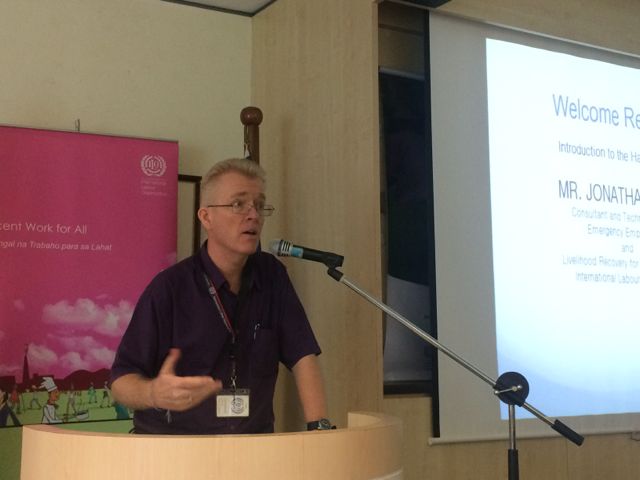SUMMARY
This is AI generated summarization, which may have errors. For context, always refer to the full article.

MANILA, Philippines – After two years of funding rehabilitation efforts in areas ravaged by Super Typhoon Yolanda (Haiyan) in 2013, what is next for international organizations?
International groups fear that life in the region would go back to pre-Yolanda days, when it was already considered one of the poorest in the country.
“We are conscious that now that much of the international aid is completing and still finishing, we are aware that there might be kind of tendency to go back to old practices,” said consultant Jonathan Price in the meeting with the media on Thursday, November 5.
Price is International Labor Organization (ILO) technical advisor for emergency employment and livelihood recovery projects for Yolanda-hit communities. (READ: DSWD, ILO partner for sustainable livelihood)
“We don’t want to go back to the pre-Haiyan situation where people are exploited. It’s a challenge to be able to do that,” he added referring to instances where locals are not given decent work or provided with social benefits.
Campaigning sustainable livelihood
This prompted ILO, together with Save the Children and Oxfam, to launch the “Decent Work” campaign to remind workers – and employers – about the importance of a “sustainable livelihood.”
The campaign, which consists of print ads and a radio public service announcement (PSA), will be rolled out in areas such as Tacloban, Ormoc, Tagbilaran, Metro Cebu, and Puerto Prinsesa in the coming months. Radio announcements will be in each province’s local language.

According to project heads, desperation and helplessness lead people in the damaged communities to resort to jobs or employers who are abusive and indifferent to their laborers.
With the benefits of social protection as its primary message, the campaign aims to bridge the differing perspectives of workers and employers when it comes to labor rights.
In its two-year intervention with the communities, ILO was able to help 150,000 Filipino individuals to “recover from tragic events,” Price said. (READ: Farmers turn Typhoon Yolanda wastes into livelihood)
“We want to ensure that employment situation should not slide back to status quo. The campaign aims to increase awareness on rights as well as appreciation of community in decent work,” he said.
Social protection
Among ILO’s primary concerns is their beneficiaries’ continued contribution to their Social Security System (SSS) and Philhealth memberships.
As they provided emergency employment to communities by hiring the people as workers for the project instead of getting independent contractors, ILO also enrolled them to these social safety nets.
More than 10,000 workers were registered members and, for 3 months, the United Nations (UN) body paid for each worker’s monthly contributions.
But after their assistance, a number of them were unable to fulfill their monthly dues because of their small income.
The social security firm acknowledges the problem but still encourages their members from the Yolanda communities to continue their contribution.
“Three months is not enough in the availment of future benefits. The minimum contribution is 110 so they can drop that to 110 at least,” said SSS representative Noel Cuyupan, who was present during Thursday’s media conference.
“SSS is trying to come up with mechanisms by which we would be able to facilitate somehow make the act of paying a lot easier for them,” Cuyupan said.
But even with SSS programs in place, ILO and the other foreign groups recognize that workers need a “decent income” to continue with their contributions.
“Everybody wants sustainability together the workers. They see the benefits of the social protection. They want to be able to continue making payments. To be able to do that they need employment. They have to have a decent income,” Price said. –Rappler.com
Add a comment
How does this make you feel?
There are no comments yet. Add your comment to start the conversation.